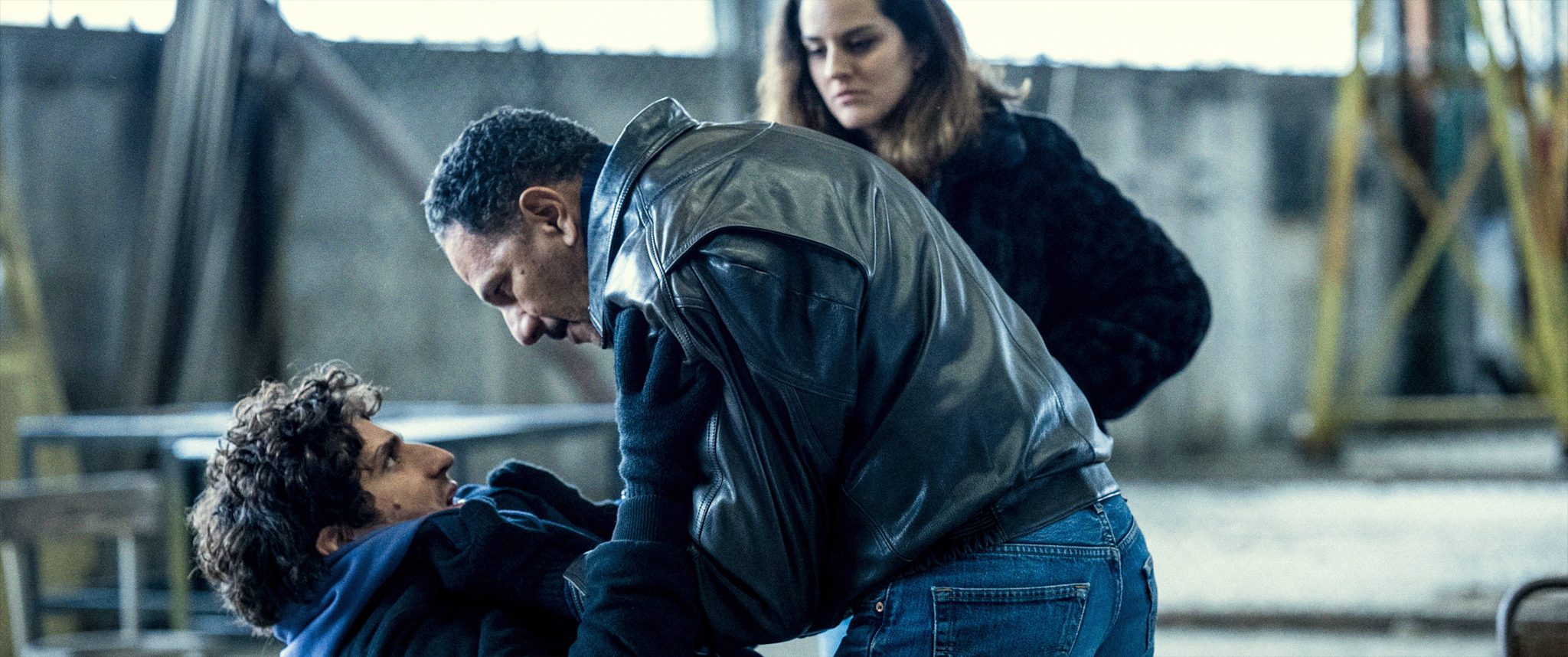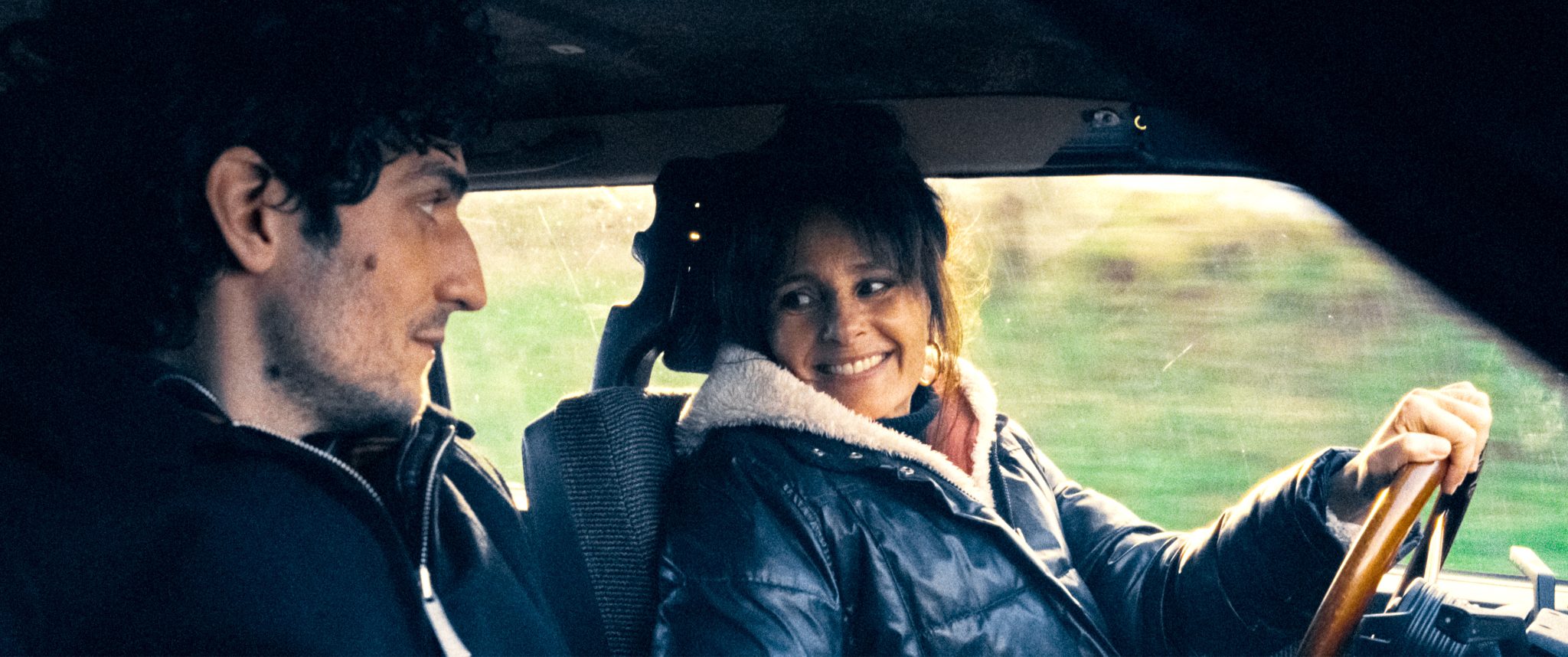L’innocent – Louis Garrel, pasticheur
Let us imagine a warehouse full of machinery, conveniently arranged to feature a few chairs and some tables – sitting at them, we have a couple and two spectators/trainers that direct their acting. None of them knows how to act, but they are guided by the situation: they must attract the attention of someone, to make them linger a little while longer at a restaurant table, while in the background, someone is pulling some strings. She is enthusiastic, but he’s coming across like a plank of wood and cannot enter the role. All sorts of attempts are being made to loosen him up, even a scared dog is thrown into the mix, and he barely moves an inch. It’s probably the most enchanting portrait of a misanthrope that I’ve seen in a long time.
L’innocent, the new film directed (and acted) by Louis Garrel crosses several genres with ease; first, it’s a comedy about a capricious, downcast, almost asexual individual who can barely contain his Oedipal complex; then it’s a suspense movie in which he follows his mother’s new boyfriend, an ex-convict, in a Hitchcockian manner, thinking that he will prevent his next robbery; then it’s a romantic flick wherein the man finally opens his eyes to the world and allows himself to fall in love. All of this sticks together somehow also within the structure of a heist movie that is not so much about action, physicality, and guts, as it is about the atrophied muscles of this protagonist that are finally starting to have some blood flowing through them.

There are a lot of mixups surrounding Abel – an alter ego of Garrel’s, profiled in all sorts of Truffaut-esque situations, as he traverses love triangles, confused, without a home (Un homme fidele, 2018), caught between a man and a woman (Deux amis, 2015), growling and solitary. It’s a metafictional wager that Garell is more than aware of, connecting himself to a directorial tradition of constructing a self-ironic double that is performed by themselves, reprising him from one narration to another, concocting more and more situations (see Chaplin, see Tati).
Garrel leaves many crumbs like this behind, consistent enough for a quite recent directorial career. Let’s take the child of uncertain paternity in Homme fidele, for example, who reappears in the same role in La Croisade, 2021, where he truly is Abel’s son; it may or may not be a sequel of the same story, especially because Homme fidele ends with the two becoming father and son, at least at a symbolic level. Then, the autobiographical element is heavily underlined, as the all-doing protagonist is joined by women who are performed by Garrel’s current and ex-wives – and the older the protagonist grows, the crankier he becomes (towards the end of L’Innocent, he is called upon as a witness at the police station, where he nonchalantly declares himself to be a poet).
In L’Innocent, he’s not necessarily a poet, but he has a dose of Peter Pan in the land of fish – he is a guide at the local aquarium and tells children about rare species, amongst them the axolotl, a salamander that retains its juvenile feature throughout its entire life; in the same vein, Abel is capricious like a child, and so, of course, the film’s narrative mission is to see his coming of age, morally speaking.
Garrel pulls most of his films off – he is generally attached to an intimate, family/couple-based form of filmmaking, which he has partially borrowed from his father, Philippe Garrel. When he leaves his usual structures, like he, juggling with popular genres, he does it aptly and with aplomb, creating pastiches of the very masters of suspense, Hitchcock and (his supreme pasticheur, or rip-offer, as Andrew Sarris would put it) Brian de Palma. It’s an entire recipe of hat tips, which are themselves mise-en-abyme references to other films, as if they would talk to themselves in surprising ways: a car chase that reprises the path taken by Marion Crane in Psycho – Garrel even borrows Hitchcock’s ellipses and music. From De Palma he gets his split screen, together with a pastiche of The Conversation from Blow Out – in Garrel’s film, Abel listens to a device meant for surveilling canines which he attaches to the coat of his mother’s boyfriend.
Speaking of connections, it’s funny to witness this passage from the listening devices of the seventies, when The Conversation was released, to these hi-tech cameras which dog owners attach to the legs of their pets to surveil them. Garell doesn’t use these references haphazardly – De Palma himself started by pastiching the French New Wave. Even though L’Innocent is set in the present (what with its Tinder and pet tracking), the film’s soundtrack and these relatively easy-to-decode artifices are indebted to the seventies and eighties. And so, it’s pretty clear that Garrel is interested in the human paradoxes that are created by technology (among other things, La Croisade is a film about how a handful of children end up creating a gigantic artificial lake in the Sahara by cleverly using the internet).

Even without this long parenthesis about pastiches, the film holds its own as a romantic comedy with typical Hollywoodian effusion, in a loop. Abel is set into contrast with all sorts of solar, luminous characters that are capable of making him laugh more than once: an eccentric and wacky mother, an impulsive and jovial girlfriend who is incapable of saying no, who always jumps at the occasion no matter the danger; living, vibrant, fully-fledged characters are the reason why the film’s boilerplate ending functions. And they are joined by Garrel’s talent at putting them in unusual situations – at the very beginning of the film, where the mother and son end up frantically running after the van which carries the parent’s boyfriend from one jail to another, or the planning of a heist that turns into a lesson about credibility in cinema.
L’innocent is Garrel’s attempt to make films that have larger proportions, that are more spectacular, but in the end, they remain humanistic (no travels from one apartment to the other, from one girlfriend to the other while carrying three heavy bags) and has certainly caught the attention of a different kind of audience. It’s no wonder that the film shone at the César Awards. What remains to be seen is whether he will settle for this, or if he will set his sights on higher planes.
Title
L'innocent
Director/ Screenwriter
Louis Garrel, Naïla Guiguet, Tanguy Viel
Actors
Louis Garrel, Roschdy Zem, Noémie Merlant, Anouk Grinberg
Country
Franta
Year
2022
Distributor
Independența Film
Journalist and film critic, with a master's degree in film critics. Collaborates with Scena9, Acoperișul de Sticlă, FILM and FILM Menu magazines. For Films in Frame, she brings the monthly top of films and writes the monthly editorial Panorama, published on a Thursday. In her spare time, she retires in the woods where she pictures other possible lives and flying foxes.


